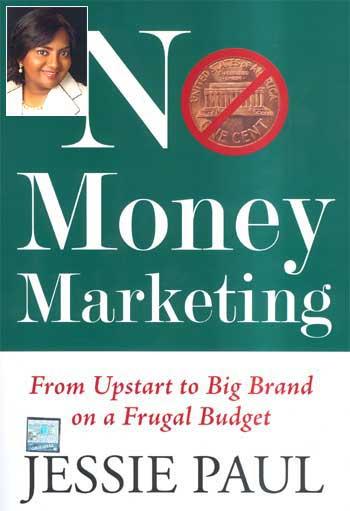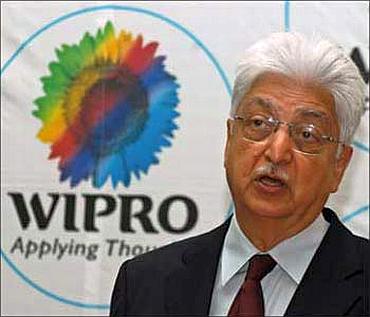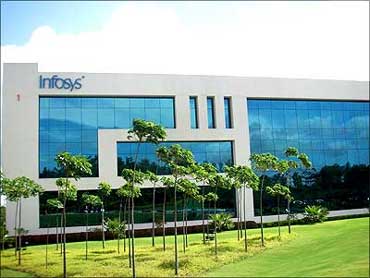
It was too much of money and a high-flying corporate career to sacrifice. But the thrill and adventure to control her own destiny tilted the balance in favour of entrepreneurship for Jessie Paul.
"I am having more fun as an entrepreneur than I did in the corporate world," says Jessie, who had had fruitful stints at advertising firm Ogilvy & Mather, and software biggies Infosys, iGate Global and Wipro before she quit Wipro as chief marketing officer to start her own marketing and advisory company Paul Writer Strategic Advisory.
Credited widely with being part of the effort that made Infosys and Wipro brands to reckon with, and author of No Money Marketing, Jessie grew up in Nazareth, a small town in Tamil Nadu, down South, after her father, an Indian Foreign Service officer, moved to India from Australia when she was a young kid.
Though growing up in a small town wasn't a handicap for her personally she believes that people from small towns do face certain problems.
"One is, your awareness of the kinds of jobs available is definitely lesser than somebody who's grown in a more open environment. Things like advertising don't exist in small towns," says Jessie who despite being a computer science engineer built a career in advertising and marketing.
She believes, that her parents' teaching her to go and ask for things when you need it made all the difference in her life.
"Ask for something if you want it. I often give this advice to people because if you don't ask for something how do people know that you want it. They can say no, it's all right, but most of the time they say yes. Which is why I always went door-to-door looking for a job," she says.
Interestingly, her door-to-door calling helped her secure jobs at O&M and Infosys.
In an interview with Prasanna D Zore, Jessie discusses her interesting career progression at Infosys (she began writing brochures and eventually became a brand manager), Wipro, the lessons she learnt, why she decided to quit a Rs 60 lakh per annum job at Wipro to become an entrepreneur, her success mantras and advice to young entrepreneurs.

You wanted to be a managing director at 40. Now that you are one, what's your next goalpost? What's your ambition in life now?
I don't really have a structured, title-based goalpost for the next 10 years. But the overall vision is that if somebody were to think of marketing in India they should think of Paul Writer as the first choice.
Can you tell us about your life as an entrepreneur? How different has it been from working for top-notch software companies?
I think it is good to have corporate experience because when you try entrepreneurship after 15 years of experience you have the requisite credentials. Having corporate experience makes it easier somewhat than if you were to have a start-up rolled after college.
I am having more fun as an entrepreneur than I did in the corporate world. The main difference is that you control your own destiny and have control over what you think is good and achievable for the company. When something goes wrong you have only yourself to blame.
But in the corporate hierarchy, typically there are many layers, so in that environment you may have a great idea in which you may completely believe in but you still have to get approvals because you are not really working with your own money but somebody else's money.
Even if you are a CEO of a company there is a board sitting there to which the CEO is accountable. So your ability to take a risk with your ideas is somewhat restrained. But when you are your own CEO, you are not too restrained while taking risks until you are listed.
What's your revenue model like?
Paul Writer Strategic Advisory was founded in January this year and today we have three different lines of businesses. Each of them has a slightly different revenue model.
The first is as a marketing advisory where we talk to companies from how to build a marketing plan and help them execute it. This is a pure consultative, fee-based model. And since I want to work on each account personally, giving them the best quality work, I don't look out typically for more than 12 to 15 clients in a year. It's a reasonably high margin, low volume line of business.
We offer two options to our clients: a fixed priced model where we come in, write a marketing plan, help you to set up some execution engine (say a web site) to deliver it and then we leave. The other model is where we are on a retainer programme where we create the position and help them to write the marketing plan but we are also there to supervise on a more long-term relationship where we earn recurring income.
The second line of business we went live on, but haven't yet launched it, (but) have 600 members in two weeks and we are adding 15 to 20 members every day. Here the model is we provide thought leadership, research, content, job polls etc. Anything a day-to-day marketer wants. Here one set of people who are consumers of content and there is no intent to charge them anything but there may be customers who would want me to help them with underwriting an event, research etc because they have a business alignment and would want to reach out to an audience.
This model runs on consumer-customer differentiation where consumers don't pay but customers may pay for it. I am doing this not because I want to earn more but build a marketing infrastructure in India.
The third line of business that is coming soon is to look at the areas of discussion on the community side and see whether people would be interested in professional development, workshop, personal certification etc and identify experts who can deliver on these parameters. The interesting thing is this is a scalable model because you can always repeat course material.
Tell us about some interesting challenges that you might have faced in your transition from an employee to an entrepreneur.
The first transition challenge was figuring out the set up: how to get the company registered, how to pay the so many taxes, finding your lawyer, chartered accountant etc is a first bit of learning.
As an employee there are a number of things that your company does for you but which as an entrepreneur you have to cope with now. If you want some space you have to create that space; if you want to book a flight ticket, you have to book it yourself. You become responsible for creating all these systems.
But then I don't have any problem with what I am doing now and don't miss the corporate set up at all. My experience as an entrepreneur could be a little different from others because I am starting a little later. So far I have not had any major transitional issues at all.
How did you bankroll your enterprise?
I am self-financed; I am using my provident fund to roll my company.

Are you not feeling insecure then? You are putting your retirement at risk...
No, I am not because actually I am cash flow positive in the first seven months of our existence and I am using money from our first line of business. That was basically the idea to start three lines of business streams. Advisory people pay upfront; so you have some money to build your web site. We went live in about 30 days with our open source platform which is really cool for a community site. So we are investing some time and money into that.
The third revenue stream is event side and so we will need a little bit of money to bankroll it.
The biggest cost for my start-up was renting office space and we had to spend a huge amount in rentals. Also, I wanted an old-fashioned office, with no cubicles. So we actually have genuine antique furniture. We spent this amount because as a start-up we didn't want to give an impression to our customers that we were doing it for some hobby and might shut shop in the middle of a project.
It was a conscious decision that I would have my office in a proper building, a landmark in Bangalore. Not doing this doesn't really work with a consulting company. That means my office looks more like a law firm.
The biggest thing that I am actually making as an investment is that I am forgoing a big fat package which was reasonably substantial. I hope to make that kind of money at the end of the second year of our operations.
Would you mind putting a figure to your reasonably substantial pay package?
You can actually go through Wipro's annual report which is in the public domain. I honestly never saw that kind of money in my hand. The annual report states it at Rs 60 lakh (Rs six million) including company ESOPs. Excluding the perks it would still have been Rs 50 lakh (Rs five million).
Let us rewind and talk about your career after graduating as an engineer. And later what prompted you to join advertising? Sounds like a lot of disconnect for a career woman like you?
My first job out of college was as an assistant support analyst at Tata Elxsi. They moved me into training and I taught UNIX and C (both higher level computer languages) for around nine months. The only thing was I happened to sit next to the person who was into marketing and that seemed like so much fun and something that I could be good (rather) than what I was doing. I always wanted to do something where I could be really good. I wanted to be the best at something and I knew in my college days that I could never be the best programmer.
In your class you know that some people have it and some don't. But I didn't know what else I could do because I come from a very small town where your choices were -- you want to be either an engineer or a doctor.
We didn't know about any career like advertising and marketing. After discussing what marketing was all about and talking to advertisers who would come to meet her (the marketing girl at Tata Elxsi) I decided to do an MBA. So I left Tata Elxsi in a year's time and enrolled for a postgraduate diploma in marketing from IIM Calcutta.
At that time no advertisers would come to campus and I got a placement with Reliance. But I wanted to be in the ad industry so I went door-to-door looking for a job in advertising. I knocked on Lintas, Hindustan Thompson Associates and Ogilvy & Mather, and O&M gave me a job.
I never got a job via a proper source. It was always door-to-door calling.

Why didn't Lintas and HTA offer you a job?
Actually most of them were puzzled as to why I wanted to join them (bursts into laughter). They looked at me like I was totally mad and gave me good advice asking me to do something else. At Reliance I was making Rs 4 lakh per annum in 1995 which was quite a substantial amount in those days but at O&M I was paid Rs 90,000 per annum and my mother was like when you did an MBA I thought you would earn more.
My salary at Tata Elxsi was around Rs 83,000 per annum. Thankfully, my MBA was not very costly in those days and I had to spend only Rs 17,000 per annum for my diploma.
How did Infosys happen then?
I left O&M after about three years when we shifted to Bangalore after my husband first got a job there. Again I went door-to-door asking for a job at IT companies because people told me that it was a big thing globally then. After short listing a number of IT firms in Bangalore I cold-called Infosys, Wipro and a host of other companies.
I actually got offers from both Infosys and Wipro at that time. They were like you are a computer science engineer but you also know marketing which is a desirable thing.
In 1998 I hadn't honestly heard much about Infosys. It was big in Bangalore but not a mass sensation that it is today and I wasn't really reading a lot of financial newspapers back then. Actually I was looking at both the offers, the compensation was pretty much the same in both the companies, and then my father-in-law, who worked for Citibank and who is also into stock markets happened to see my offer letters.
And he was like, don't mind, do you know what the Infosys' stock price is. The thing is, he said, they might give you stock options. I think you might want to take the offer from Infosys, he gently hinted to me and that was it.
What kind of interview was it at Infosys?
The final interview was with Nandan, who was head of sales, marketing and Finacle at Infosys then. It was a very cool interview. They wanted somebody who could understand brochures, website and all that. Actually the big trouble was getting them to call me for an interview. Every time I called their HR unit they were like, 'Oh you are the girl with the computer science degree and we need good programmers' and I was like I want a job in marketing and they were like we will call you back next week. This kept happening for around a month.
But Nandan's interview was the sweetest I've ever had. The questions centred around can you do brochures? At O&M we did like one brochure a week and Nandan was like can you do more than one brochure in a year? Remember this was 1998 and Infosys was doing some amount of, what I would call today as, sales support, a new department that they had started as they thought they needed some branding. So there was a marketing operations group and marketing strategy group and I was looked at for the latter.
Coming from an ad background the interview did seem very sweet. Later I found out that they were keen on somebody, they hadn't found anybody so... so they found me.
How did you manage to climb the rung at Infosys?
At Infosys later one day Nandan found me doing HTML and he was like why HTML? I told him that I have run out of brochures and since I have nothing else to do I thought I would be useful if I wanted to do a web site. This got me a chance to do a web site, which was considered very cool back then.
After that I badly wanted to be a part of the global team because I wanted to go abroad. I hadn't seen the world. I got hold of Phaneesh Murthy (he later quit Infosys to join iGate), who was heading Europe then and I asked him to give me Europe and told him that if nothing works out you can take it back. That's how I got the portfolio to handle Europe and Asia marketing.
So from brochures, it expanded to web sites, then Europe and slowly over the next three years it built up into a brand manager's role for me. But I was hired basically to do brochures.
The important thing that one has to keep in mind while progressing in one's career is you can always make a role what you want to be. If you want to grow in a role the way is not to go and ask for promotions but to start doing more and say that look I am doing so much why don't you give me the title. There was no title called brand manager at Infosys till I showed up and then once I had this big portfolio in Europe I went and negotiated when we were discussing titles asking them to make me one.
The great thing about it was that the Infosys management gave it.
What does it need to progress in one's career?
If you go to your senior and tell her/him make me this s/he will never do it. Instead if you do that job and go and tell your seniors that I am already doing the job why don't you recognise it, then it might just click. Unless you show how you did things better and differently from last year nobody's going to recognise you. Why should somebody give you promotions?
A lot of people today ask for promotions first and then I will show you what I am worth. The easier way is to show your worth first and then ask for promotions. That's an investment that you have to make. If you build up your role nicely and then if you still don't get what you want then you can at least go to another company and tell them look I was handling this huge portfolio and you might have a better role there.
It doesn't matter whether the company wants to expand your role or not, you should question whether you are doing more and better this year than you did the last year. Otherwise you will just waste yourself.
After Infosys you went to iGate and then to Wipro. Tell us about your Wipro experience?
At Wipro my first interviewer was with Vivek Paul who was then the CEO and later I had my final interview with Mr (Azim) Premji. That interview is very reflective of the culture there. It was like a panel interview with the head of HR, head of Wipro Consumer Care and Mr Premji. I still remember that the only question that he got deeply puzzled about was the strength and weakness part of my CV where I had mentioned that work-life balance was my weakness. It's a standard weakness that most of us put stating that you spend more time at work then at home with family. Very safe little thing to put, I thought.
He was fascinated that there was somebody who wanted to have work-life balance. He wanted to know how I could attain it? And I was not prepared for it. Actually, I never thought somebody would so attentively read my CV. They asked me to go through an in-house test the result of which doesn't tell you whether you are good or bad but it helps to get lot of psychological and behavioural analyses takeaways from it about a person.
It's a very quantitative kind of approach to recruitment which is very structured and which most senior recruits at Wipro have to go through. The exam shows whether you are a follower or a leader. This test helps understand recruiters what kind of a person you are or you could be in the future.

Your advice to young entrepreneurs...
I can tell what's worked for me. There are three Ps you need to consider and in fact it is inspired from Jim Collins (an American business consultant and management guru):
The ideal thing would be at the intersection of all these three Ps: Passion, Perfection and Profits. One of these elements not falling into place might make your entrepreneurial journey unhappy.
I find that a lot of Indian start-ups do not invest in marketing. They say they will do it after they become big. Many of them are actually destined to be doomed because they have not invested properly in marketing. If you are an entrepreneur you have to really worry about how easy is it for someone to replicate your model. Because the moment you enter the market someone else can copy it. If you don't differentiate your business idea in the early stage itself then, maybe, you will not achieve the large size that you are dreaming of to build your brand.
Was your being a small-town girl act as an impediment in your career progression?
Though it was not a personal handicap, there are certain problems you face being from a small town. One is, your awareness of the kinds of jobs available is definitely lesser than somebody who's grown in a more open environment. Things like advertising don't exist in small towns. Your parents have never heard of the job or the career opportunities that such a job can offer then they will not push you in that direction at all. Perhaps somebody from your town may have gone to do engineering so you may know about it.
The second drawback is if you look at popular jobs as they exist today they do emphasise on communication skills and presentations. If you come from a small town then your opinion of fashion, your English isn't necessarily on par with somebody who went to a fancy school in a metro. And if your interviewer is not looking at your competency bit in that situation then it could be a challenge for you getting that job. I think it takes two to three years to overcome that.
Did it happen to you as well?
Yes, of course. Even I went to a local school where I got great marks but while the text books were in English the teacher could speak Tamil as well to explain a concept to the class. I was not a typical example of a small town girl because I also studied abroad till Class V to that extent my English and my horizons were a little broader. While it is not that people don't want to teach you well but there are limitations of going to small-town schools.
The values that your parents taught you...
Believe in yourself and ask for something if you want it. I often give the second advice to people because if you don't ask for something how do people know that you want it. They can so no, it's all right, but most of the time they say yes. Which is why I always went door-to-door looking for a job. And people gave it to me (laughs).